
THE DAILY GRIND Orozco’s stories are about routine and the dangers of disrupting it. |
“Temporary Stories,” the eighth entry in Daniel Orozco’s debut collection, Orientation (Faber and Faber), is a gem and a killer. Not since Henry James’s “In the Cage” has a writer so perfectly captured the anxieties of interacting with the public for pay. Somehow, Orozco manages to convey James’s psychological acuity with one-tenth of his clauses, mingling it with Steven Millhauser’s sense of lunatic joy.
Reading the story on the bus one afternoon, I experienced a jolt of recognition so acute, it made me nauseated. The protagonist, a crackerjack temp named Clarissa Snow, gets an assignment answering phones at a hospital with an unnamed co-worker. “The two of them worked in the Human Resources lobby, within a circular counter situated in the middle of a low-ceilinged, windowless room with recessed fluorescent lighting, dusty potted plants, and the oil portraits of hospital benefactors bolted to its walls.”
Anyone who’s ever been to a hospital or a corporate home office has been in this very room, has stumbled through the miasma of modern American business décor. What’s outside Clarissa’s tomb, though — that’s even worse. She spends her days taking calls from miserable job seekers on the brink of madness. (Sample: “Do you think I should apply for this position to get my foot in the door and take the chance of getting stuck in a dead-end job?”) The irony, of course, is that Clarissa is a temp and thus must sublimate her own crazy feelings in order to earn her meager keep.
For more than a year, I worked for an international megaconglomerate, one whose primary function was to take over companies and fire people. I spent my days mailing letters of dismissal. It was like the George Clooney vehicle Up in the Air (from the Walter Kirn novel), but with an anorectic, hung-over boss who would inadvertently burp up the previous night’s Pinot and the chicken broth she drank instead of lunch.
When I call Daniel Orozco at home in Boise, he’s unfazed. “Everyone’s had a job like that,” he says.
Your stories have a very strong thematic link. Was that intentional?
When I wrote my first story, I didn’t have an idea of a story collection—it was just a story. Each of these came up on their own, with no sense of assembling them in a book—at least not for the first few years that I was writing.
When I first tried to peddle the collection—many, many years ago, when I only had two or three stories—I was told that they don’t really quite hang together, they’re too different. What’s interesting is they do hang together quite well. They just all came out of me, and I’m working with these thematic concerns that keep coming up again and again. That’s kind of a nice surprise, because that wasn’t anything I worked at.
Where does your concern with the quotidian come from?
The first story that I wrote was “Orientation.” Every time I write a story, I approach it as a problem that needs to be solved. I think: can I do this? With “Orientation,” it was, can I tell a story where there really is no central character and give it an arc and movement and make it emotional?